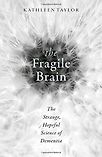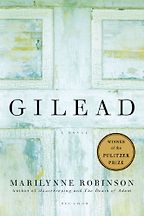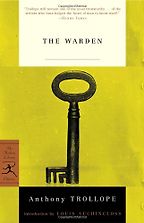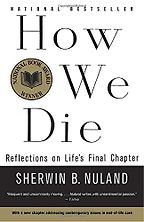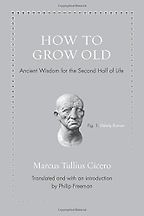You’re a scientist by background and have been studying dementia and Alzheimer’s—these awful diseases that can happen to the brain as we get old—but three of your five books are from literature. I wondered whether that suggests you think fiction is the best way of understanding the process of ageing?
I’m more of a science writer than a scientist these days—but, yes, it does seem to me that literature is one way of understanding old age and the processes of ageing. A lot of the problems that we have with old age when we’re younger are a failure to empathise with older people and to really understand what it feels like to be old—as opposed to what it looks like intellectually. So I’m keen to bring both perspectives in.
I’m not saying that I don’t think the scientific perspective is important, it really is, but I think if you blend that with a more understanding or internal perspective, it can help you understand the person. You can’t really know what it’s like to be old until you’re old but literature can get you a bit closer than, for example, the study of biochemical proteins and what they do in the brain.
To understand more fully, let’s get into the books you’ve chosen. The first on your list is Gilead (2004) by Marilynne Robinson. It’s a favourite book of Barack Obama’s—he actually interviewed the author at some point—so I’m taking it as a given that it’s a good novel. Why have you picked it as a good way of getting insight into ageing?
Gilead is a great book. For a start, it’s told from the first-person perspective of a very old man and there aren’t so many books in literature that are narrated by old people. This is somebody who is very much at the end of his life and he’s writing to his much younger son. He’s had this child late and he’s old enough to be his grandfather.
A lot of the book is about fathers and sons and the relationships between them and how they can be difficult. It’s also a lot about faith, so it comes from a very different perspective from the scientific work that I’m used to.
It’s a remarkably empathetic and beautifully written book. It deals with a lot of the themes of old age. It deals with a lot of the anxieties about physical failings, and anxieties about legacy. It really makes you feel that you’re being put in the mind of someone who hasn’t got long and is coping with that.
The author was born in 1943 and the book was published in 2004. She’s writing it when she’s getting into old age but still much younger than the protagonist.
One of the things that comes out of the book is that this man has lived a hale and hearty life for most of his life, but has now been stricken with the disease that’s going to kill him. So his old age, in a sense, has come on quite suddenly. That raises interesting questions about what old age feels like and how much of it is disease and illness—as opposed to old age.
“One of the bigger risk factors for Alzheimer’s seems to be loneliness, just sitting at home all day and not actually seeing anyone.”
That’s central, of course, to the discussion of dementia—how much of it is disease and how much of it is normal ageing? In a sense, what comes out of all the books I’ve chosen is that what makes you old is the stresses, the tribulations, the diseases, the traumas that you’ve endured—rather than the actual number of years on the clock.
This book plays with a lot of the themes in ageing research, only from a literary perspective, obviously.
I was struck by one of the sentences in your own book, The Fragile Brain: the Strange, Hopeful Science of Dementia, that it was partly about ‘knowing the enemy.’
That was a slightly ironic comment but not entirely, because a lot of people do regard Alzheimer’s and dementia as an enemy. The medical or scientific view of it is that it’s a curse that has to be conquered and vanquished. I experienced it as an enemy because that’s how it felt to my family when we got struck by these brain disorders that came all at once. It really felt like we were under attack. So, there is that very natural reaction.
But there’s also a sense that dementia and ageing, particularly, may not be so much about facing an enemy as coming to terms with one’s own mortality. That is quite a different perspective.
One distinction that drives a lot of thinking about old age is between ‘right old age’, which is as it should be, and the ‘wrong old age’, which is old age afflicted by illness and decline and things that shouldn’t have happened.
I interviewed the American author and intellectual, Susan Jacoby, on this site, about atheism. Her partner had suffered from Alzheimer’s and she talked about how some of us end our lives “losing the very thing that makes us human, our brain.” It’s very traumatic, seeing these diseases in your loved ones.
The level of trauma varies depending on the exact conditions but some dementias can be incredibly cruel and really, really horrible.
But there’s quite a lot that can be done to lower the risk of age-related brain disorders, isn’t there? In your book, you look at the latest research and interpret it for a lay audience. What’s the latest?
I’m afraid the message is an old one. You cannot cheat fate altogether—you are going to die of something and it may well be Alzheimer’s, which is very common. Some unfortunate people have a genetic condition that makes dementia inevitable. But apart from those, for the vast majority of people, there are things that you can do to lower the risk.
Get the weekly Five Books newsletter
What it seems to be is a kind of accumulation of stresses, if you like, on the body and the brain. Old age is the biggest risk factor and then there are certain genes that are risk factors and then, after that, there seem to be certain environmental things that are likely to increase the risk of getting it.
Just because you live a clean life and don’t breathe any polluted air and exercise and drink moderate alcohol and don’t smoke, it doesn’t mean you’re not still going to get dementia. But, all things being equal, if the whole population did that, then their risk would drop.
What about the reports you see in newspapers—that by doing Sudoku or learning a foreign language (say)—you can lower your risk of dementia. Are those reports anchored in science?
All of that Sudoku/foreign language stuff is built on the idea that the brain is like a muscle and you use it or you lose it. It’s like with physical exercise. The research on that is suggestive but not, I would say, conclusive. That’s because it’s still not well understood how much of what contributes to what they call your ‘brain reserve’—the ability of the brain to withstand problems—is down to your genes and your early development and what happened in the womb, and how much of it is due to ongoing usage.
What we do know is that there is a certain amount of evidence that keeping your brain active can help stave off things. That doesn’t necessarily mean you have to go and learn a foreign language. It means things like going out and socialising.
“I have had people say to me, ‘Knowing that amyloid protein does XYZ is all very interesting but how’s that going to help?’ Well, indeed.”
One of the bigger risk factors for Alzheimer’s seems to be loneliness, just sitting at home all day and not actually seeing anyone. If you talk, you’re using your brain, and when you’re socialising you’re actually doing yourself a lot of good. You don’t have to get a PhD in some science if you don’t feel like it. There are other ways.
Exercise seems to be coming up in a lot of studies at the moment. Exercise seems to reduce the risk of everything under the sun.
Again, there’s still a lot of research to be done on this. But, basically, the idea is that exercise increases blood flow and blood flow is very important because a lot of what goes wrong in dementia may involve problems with brain blood flow.
Shall we go on to The Warden by Anthony Trollope? This was published in 1855 and he’s writing, I think, when he’s about forty—but his protagonist is also old.
He is. The Warden is interesting because, again, you don’t get that many books—at least not ones that I’ve come across—that have an old man as the protagonist. It’s the first of a set of six novels and I just happen to like Trollope anyway. It’s not the best book in the world and I don’t think it’s even the best Trollope.
But he’s very good on the social interactions. The old man has an old friend who’s the bishop and the relationship between them is charming and done very well. He has a nice daughter who looks after him and another daughter who is married to an archdeacon and, my goodness, they bully the poor man! They are just convinced that they know what’s best for him. It’s a rather sweet portrayal of an old man and you just want them to leave him alone and stop telling him what to do.
So it’s very interesting on intergenerational issues and how kids can sometimes be convinced that they know what’s best for Dad when really Dad would rather just get on with it. And, indeed, Dad does just get on with it and decides to do what’s right. They all think it’s a terrible idea and he goes and does it anyway. It’s a rather lovely book and an offer of hope for all those old people who are being bullied by their children.
It’s kind of like Gilead in that it’s about faith and being true to yourself and people not understanding each other. But it’s a very different angle on it.
Is it coincidental that both of your first choices have religious themes? Does faith play a big part in ageing?
I think it can. It plays a much bigger part in Gilead than in the Trollope. I think faith is a way of making sense of a very difficult thing. Psychologists call it ‘terror management’, the idea that we are going to stop existing and that that’s a very difficult idea for us to handle. Religion is one way to cope with that, but there are others.
The idea of legacy is an often-used way of dealing with it—the idea that you go on in other people’s memories. You go on in the work you’ve left behind and in your children. That’s an alternative route that almost denies death by saying that there’s a little bit of you that will continue to live. Even people who are religious will use that route as well.
The thing about old age is that it’s death that is foreseen—if it’s not a sudden or a violent death, you can get used to it and approach the idea. That’s also, I think, interesting.
I’m just reading The Leopard which has a middle-aged man who seems to be very aware of his mortality. Is it common, psychologically speaking, that in your mid-forties you start dwelling more on these things? Or is it triggered by the death of parents?
I think it’s partly the death—or the ageing—of parents, these days. You’re kind of caught because the kids have grown up and you’re not as much of a parent in the sense that you’re not there looking after them all the time. They’re fleeing the nest and so, in a sense, you’re losing one part of your function.
And, yet, you’re having to reverse another part of your function, because you were a child and then you have to stop being a child and you have to grow up. And, of course, if you lose a parent then you do grow up and everything changes. So it’s a difficult time of life.
The next book you’ve chosen is How We Die (1993) by Sherwin B Nuland. He was a doctor at Yale, so he’s coming at it from a medical perspective, rather than a literary one. Tell me about this book.
One thing about this book is that, although it’s not a literary perspective, it’s one of the best-written doctor’s books I’ve come across. It’s also interesting on faith because he comes from a faith background, although he himself is agnostic.
It’s a description of what people actually die of and the mechanisms by which life is extinguished. He’s very blunt about it. He has a striking opening chapter where he’s a young rookie doctor, confidently looking after his first case, and a man expires in front of him with a heart attack in the most horrendous and spectacular fashion. That really knocked him for six. That’s the beginning of it.
Again, it taps into what I was saying earlier about the idea of the good way of ageing and the wrong way of ageing. What Nuland says is that, basically, at the end of life there’s this myth that we’re all going to expire peacefully surrounded by our loved ones. And it mostly doesn’t happen like that. It’s mostly ugly and mucky and brutal and rather disgusting. We just need to face up to that.
So that’s an interesting counterargument to all the sentimentality that surrounds death and also the tidiness that we have these days. We push it away into hospitals and clinics and hospices. He says that you have to face this. You are a mortal, animal creature and, when you go, it’s not nice.
He’s looking at common illnesses that people die of like cancer and heart attacks or even AIDS. It’s quite systematic and informative, isn’t it?
Yes, and he draws out the common features. He answers the question ‘How does cancer or a heart attack actually kill you? What does it do in the body?’
This book was written quite a long time ago and it’s interesting to see, for me having just written my book, where it’s at and how the thinking has changed since his day. And, in fact, a lot of things he talks about have been developed further.
One person commenting on the book said that it was really useful for giving her an inkling of how she’d be treated by the doctor. I think she was looking after her Mum who had metastatic lung cancer. First of all, they’re all excited when things are going well, it’s all about a ‘miracle cure.’ Then, when all hope is lost, she doesn’t see much of the doctor anymore. She said that reading this book was really useful in preparing her for that.
It gives people a warning of what to expect. There may be certain symptoms, there may be nastiness, there may be ugliness to deal with, and you have to get through that. Otherwise, I suspect it would be a most horrendous shock for somebody who went in thinking that the patient just kind of lies there quietly and then breathes their last. It is not always like that. People should be better forewarned and I think that’s one of the reasons why he wrote the book.
For your fourth book choice, I love the fact you’ve chosen a book by Cicero, De Senectute. I guess old age is something that has been with us for a while.
Yes, though Cicero, of course, did not live to experience it. He was murdered before he got to that stage, so he didn’t have the chance to test his theories out. I like De Senectute because it’s one of the few books that is actually all about old age. That is the topic—it’s not about dying, it’s not about medicine, or literature, it’s about, ‘What is this old age business? ‘
He frames it as an old man, a very distinguished old man, talking to two younger men who think that he’s amazing in a ‘How are you doing it Grandad?’ kind of way. And Grandad turns around and says, ‘Well, look.’ Cicero is famous as an orator and famous as a writer. This is one of his simpler pieces. It’s quite short and it’s not one of these great, long, flowery things that he was doing when he was in the law courts.
“Fixing a broken leg or even a broken heart is easy compared to when you’re dealing with the brain.”
But it is entertaining and quite philosophical. He raises pretty much all the questions that you will come across in the later literature on ageing. One of the things I found so entertaining about it was that he had already considered and discussed stuff that people are writing about in papers and talking about being a very big issue. Well, yes, it’s been a big issue for two thousand years plus. Nothing is new under the sun.
What’s an example of one of these issues?
He talks about old age and the weakening of the faculties. He talks about whether old age should be considered a disease. He talks about the extent to which pre-existing personality influences how you age—all of this stuff that’s being discussed now.
For him, the solution seems to be philosophy. One of the speakers puts forward the idea that the blame rests with character, not with age. If you’ve lived a good life and practised virtue, then you can cope with old age. Do you buy into that?
One of the things that Cicero is saying is that ‘Yes, exercise and good living and all the rest of it is important and that will raise your chances of getting to a decent old age, but it’s also about developing the faculties that will stand you in good stead when your critical strength runs out.’ He has an example of someone who was a great runner and then complains that he can’t run anymore. Cicero says that if you spent the time cultivating your brain a little bit more, then you would have something to do when you can’t run any more.
So, use your brain, keep your social skills, keep in contact with younger people, talk to people, get out, and use your faculties. He says that a lot of what makes people miserable in old age is either (a) stuff that was making them miserable all the way through their life or (b) they don’t feel useful; and they don’t feel useful—being a bit of a right-winger here—because they haven’t made themselves useful.
So, when you think about it, he’s not actually that far removed from the modern mantra that it’s all down to diet and exercise, mental and physical.
He died in his mid-60s, wouldn’t that have counted as old age, in those days?
No. It would have counted as senior maturity but not old age. It’s always being quoted how the average age was only your 40s-50s in the old days. That is actually a miscalculation because it relates to the number of babies that died in childbirth. If you take that out, people often lived quite lengthy lives.
They often did live to, what we would consider, really ripe old age. So Cicero, yes, was considered senior and mature but there was no expectation that he would be losing his faculties at sixty.
What is officially old age, these days?
That very much depends on how you define it. If you’re looking at dementia, for example, there’s a division between early onset and what they call late onset dementia. The early onset is usually taken to be before either sixty or sixty-five. The ‘normal’ dementia is taken to be from mid-sixties onwards. But then, sixty through to about eighty or eighty-five would be considered early old age. And then oldest old age would be late-eighties/nineties. But you get people living to over a hundred.
Last on the list, you’ve got King Lear.
It is one of the great representations of old age and another fine example of intergenerational conflict. Lear is about all sorts of things but one of the things it’s about is people getting old and not ceding what their kids think they should to them and the kids trying to bully them. Interestingly, the last line in the Gilead book is a quote from Lear: “I’ll pray, and then I’ll sleep.” So, there are connections between all five of these books. They all pull on the same things.
“There are an awful lot of people sitting in care homes on their own never being visited. ”
Lear is interesting because, for example, there’s a point where one of the daughters says he’s so unmanageable but then he always was. So there’s this idea that, yes, Lear is becoming wayward and impetuous but, in a sense, he’s not because he was always like that. Now he’s old, it’s more unrestrained than it was before. Again, you have this sense of pre-existing personality and how that contributes.
For personality, of course, you just read genes because that’s the link between the innate forces that make you who you are versus the environment that acts on you. You have the same things coming back again and again. They’re there in Shakespeare like they’re there in Cicero.
I was looking at what people have written about King Lear in relation to ageing and there was a psychology paper focusing on the dread of being abandoned in a state of utter helplessness.
Abandonment is one of the huge fears of old age. I oscillated between choosing Lear and Shakespeare’s other great late play, The Tempest. Both of them are about older people dealing with power and how to hand it on. And that’s very difficult. Prospero too has the power and he doesn’t know how to shed it gracefully.
With that comes the feeling that, as you lose not only physical but also social power, you do feel abandoned. When you’re suffering from dementia, you are losing not only your physical faculties but your mental ones as well and that includes your social faculties. There are an awful lot of people sitting in care homes on their own never being visited. I know that because when I go to care homes to visit my elderly relatives, there are a lot of people there who never get visitors.
So maybe that fear of abandonment isn’t just a crazy old age thing, it’s quite a real fear. Dementia, in a sense, makes it worse because you’re not just being abandoned but you’re actually losing yourself and that’s worst of all because there is nothing there for people to relate to anymore. That’s what people are really afraid of, that they’re losing themselves. It’s hard. It’s not a good place to be when you’re lonely and you’re old.
My father, before he died, was keen to split our inheritance and give out the money while he was still alive. And I was like, ‘Wait a second, I’ve read King Lear, I don’t think it’s a good idea!’ It’s funny that at these key moments in your life you might well turn to literature to guide what you should do.
Well, literature is usually based on a certain amount of experience and there are only so many ways that people can do things. So, why not use the guide? We all do. We all rely on it, whether we acknowledge it or not. I don’t think that literature isn’t a valid way to understand something. And I have had people say to me, ‘Knowing that amyloid protein does XYZ is all very interesting but how’s that going to help?’ Well, indeed.
As you wrote your book, in terms of the science, did you feel progress in terms of cures for these conditions is being made at a decent rate?
Given how complicated an issue it is, I think, yes, it’s progressing at a very decent rate. This is really, really hard stuff and that’s what I think most people don’t understand about dementia research. Fixing a broken leg or even a broken heart is easy compared to when you’re dealing with the brain.
Also, dementia is one of those things where you can’t just go ‘ah, great, there’s the gene! Hurray! We’ll fix the gene and we’ll fix the problem.’ It doesn’t work like that. There’s an awful lot of complicated factors. And the truth of it is that, I’m afraid, a lot of them are going to be really hard to change. Some of them are going to be easy but a lot of them are going to be very difficult and that’s because our societies are built in ways that do us harm. So, we’re going to have to change our societies and that makes it difficult.
What do you mean we have to change our society?
Air pollution, poverty, domestic violence, for example. All of these are stresses, they stress the brain, they create trauma, they damage things, and they possibly age people. That’s what the evidence is suggesting. Again, it’s not conclusive but the evidence suggests that these traumas affect the brain as they affect the body and the person. If that’s the case, then reducing those traumas is going to be difficult, but essential.
Five Books aims to keep its book recommendations and interviews up to date. If you are the interviewee and would like to update your choice of books (or even just what you say about them) please email us at [email protected]
Five Books interviews are expensive to produce. If you've enjoyed this interview, please support us by donating a small amount.

